"It is vain to expend large sums of money and large portions of time in the acquirement of accomplishments, unless some attention be also paid to the attainment of a certain grace in their exercise, which, though of a circumstance distinct from themselves, is the secret of their charms and pleasure-exciting quality."
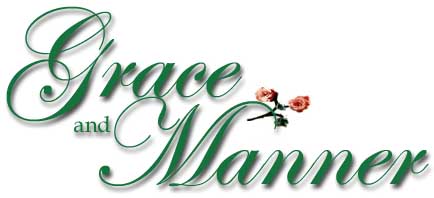 "The business of her life was to get her daughters married; its solace was visiting and news." Such is the description of Mrs. Bennet given in Pride and Prejudice. As any daughter knows, Mrs. Bennet is typical not only of her time, but of her position. The marriage game has always held a fascination for mothers. As Fanny Price quotes in 1998’s Mansfield Park, "Marriage is indeed a maneuvering business." During the Regency, when women had little choice beyond marriage, it was particularly important for a young lady to be fitted out with the skills society required for "getting a husband". The greater the accomplishments, it was thought, the greater the match. To that end young ladies were taught dancing, music and art, among other things. Music was, of course, next to dancing, the most sought after skill with most young ladies proficient in singing or playing the piano or harp. 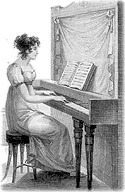 Impromptu concerts were one of the few ways a young lady could command the attention of a room and demonstrate her skill to all in attendance. Mary Bennet, Marianne Dashwood, Mary Crawford, and Jane Fairfax, were always happy to oblige. Anne De Bourgh would have been a true proficient had she ever learnt. Elizabeth and Emma took a little more coaxing, but their efforts were rewarded by warm praise and thanks.
Impromptu concerts were one of the few ways a young lady could command the attention of a room and demonstrate her skill to all in attendance. Mary Bennet, Marianne Dashwood, Mary Crawford, and Jane Fairfax, were always happy to oblige. Anne De Bourgh would have been a true proficient had she ever learnt. Elizabeth and Emma took a little more coaxing, but their efforts were rewarded by warm praise and thanks.
In transferring Jane Austen’s work to film, most screenwriters have been careful to preserve these scenes. Because of this, we are treated to not only the sounds of period pieces and instruments (Miramax’s 1996 Emma used music directly from Jane Austen’s own song books), recreating the atmosphere with which Jane was familiar, but are given the added bonus of seeing the effect of the music and/or performance reflected in the faces of those listening. Caroline Bingley states that,"A woman must have a thorough knowledge of music, singing, drawing, dancing, and the modern languages, to deserve the word [accomplished]." Lady Susan could have told her just how far those accomplishments would carry her: "It is throwing time away; to be Mistress of French, Italian, and German, Music, Singing, Drawing, &c. will gain a Woman some applause, but will not add one Lover to her list. Grace and Manner, after all, are of the greatest importance." Lady Susan’s assessment, as Jane Austen’s heroines demonstrate, does indeed seem to be correct. Though Austen herself was known to be a diligent student of music, spending hours every day practicing, none of the six heroines of her major novels are "true proficients". Most do not play "so well as they could" and three do not play at all! Of the rest of the characters who do play an instrument, none are to be held up as examples of happiness or felicity. All are deficient to our heroines in the area of "Grace and Manner". Elinor Dashwood,"neither musical, nor affecting to be so" does not play, but rather draws. "The day which dismissed the music-master was one of the happiest of Catherine's [Moreland] life." As for Fanny Price, her cousins are scandalized to learn that "she does not want to learn either music or drawing". The others play ‘tolerably well’- even ‘delightfully’, however they also know that they could do much better if they practiced more, and most, at some point, are shown up by superior performers. "My fingers," said Elizabeth Bennet, "do not move over this instrument in the masterly manner which I see so many women's do. They have not the same force or rapidity, and do not produce the same expression. But then I have always supposed it to be my own fault -- because I would not take the trouble of practicing." Emma? "She had always wanted to do everything, and had made more progress both in drawing and music than many might have done with so little labor as she would ever submit to." However, "She knew the imitations of her own powers too well to attempt more than she could perform with credit." She is proud of her ability, but knows a better musician when she hears one. 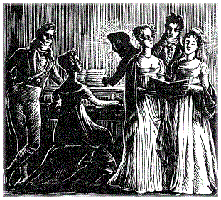 Anne Elliot, who can play "for half an hour together, equally without error, and without consciousness" is an exception to this general rule. However, "her performance was little thought of, only out of civility, or to refresh the others, as she was well aware. She knew that when she played she was giving pleasure only to herself..." We are shown, in Sony’s 1995 film, how she is neglected at the piano, left to provide entertainment while others dance.
Anne Elliot, who can play "for half an hour together, equally without error, and without consciousness" is an exception to this general rule. However, "her performance was little thought of, only out of civility, or to refresh the others, as she was well aware. She knew that when she played she was giving pleasure only to herself..." We are shown, in Sony’s 1995 film, how she is neglected at the piano, left to provide entertainment while others dance.
As foils to these heroines, we are treated to characters who can play and sing very well indeed: Jane Fairfax, Augusta Elton, Caroline Bingley, and Mary Crawford to name a few. While they all are wonderful and accomplished musicians, each has a tragedy in her life....all of them of a romantic (or lack there of) nature. Is it possible that Jane Austen, who never married, was expressing her own insights through the rather pragmatic reasoning of Lady Susan? Though these ladies are well-learned, they often come across as vulgar ("I am dotingly fond of music -- passionately fond; -- and my friends say I am not entirely devoid of taste.") or conceited. Georgiana Darcy, "plays and sings all day long", and with Elizabeth’s help, will learn to perform with poise. A&E gave us a glimpse of her performance in their 1996 production. She is clearly an accomplished musician, but lacks confidence in her abilities. Elizabeth on the other hand, is not so skilled, but quite comfortable with herself. While Caroline, Louisa, Georgiana, and Mary are all more polished performers, it is Elizabeth who is described as giving pleasure to her listeners. Again, "Grace and Manner" triumph. What about the Men? Some of them were quite musically inclined. John Willoughby and Frank Churchill sing, and Mr. Collins finds it a not unacceptable pasttime ("If I," said Mr Collins, "were so fortunate as to be able to sing, I should have great pleasure, I am sure, in obliging the company with an air; for I consider music as a very innocent diversion, and perfectly compatible with the profession of a clergyman."). Even Capt. Wentworth is seen to play a little! It is interesting then, to note that none of these men, except Frank, married the girls they performed with or for. Willoughby and Churchill are well known cads and used music for their own purposes. While both were sincere in their attentions to the ladies they accompanied, they are two of the most notorious flirts Austen created. Col. Fitzwilliam is a cultured man who can speak intelligently and entertainingly on the subject. Capt. Wentworth uses his ability on behalf of the Miss Musgroves ("[Anne] had left the instrument ... and he had sat down to try to make out an air which he wished to give the Miss Musgroves an idea of."), but it his musical nature ("Capt. Wentworth was very fond of music...") that brings him to the concert in Bath (one of the few appearances of professional musicians in the novels). It is there that Anne begins to feel that there might be a chance for them after all, "He began by speaking of the concert gravely.... owned himself disappointed, had expected singing; and in short, must confess that he should not be sorry when it was over. Anne replied, and spoke in defense of the performance so well, and yet in allowance for his feelings so pleasantly, that his countenance improved, and he replied again with almost a smile..." Unfortunately, Mr. Elliot is also at the concert and succeeds in breaking up this tete-a-tete. 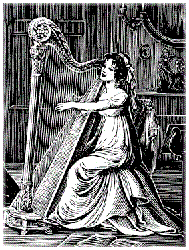 Edmund Bertram, in 1998’s Mansfield Park, is given decided opinions on the subject of music in church, however it is a testament to the fascination Mary Crawford holds for him that he "spoke of the harp as his favorite instrument, and hoped to be soon allowed to hear her. Edmund was at the Parsonage every day, to be indulged with his favorite instrument: one morning secured an invitation for the next... and every thing was soon in a fair train." Clearly, he is besotted.
Edmund Bertram, in 1998’s Mansfield Park, is given decided opinions on the subject of music in church, however it is a testament to the fascination Mary Crawford holds for him that he "spoke of the harp as his favorite instrument, and hoped to be soon allowed to hear her. Edmund was at the Parsonage every day, to be indulged with his favorite instrument: one morning secured an invitation for the next... and every thing was soon in a fair train." Clearly, he is besotted.
This is not to indicate that our other heroes are not appreciative of good music. Indeed, though their motives for doing so were often misunderstood, all listened to their beloved ones (who could) play at some point before finally proposing. Mr. Darcy and Col. Brandon come readily to mind, and are well known for the "smoldering looks" they give the fair performers. Elizabeth Bennet takes delight in teasing Mr. Darcy about his intentions: "[Mr. Darcy] moving with his usual deliberation towards the piano forte, stationed himself so as to command a full view of the fair performer's countenance. Elizabeth saw what he was doing, and at the first convenient pause, turned to him with an arch smile, and said, "You mean to frighten me, Mr Darcy, by coming in all this state to hear me? But I will not be alarmed though your sister does play so well. There is a stubbornness about me that never can bear to be frightened at the will of others. My courage always rises with every attempt to intimidate me." Andrew Davies’ 1996 adaptation makes Darcy’s admiration for her less than superior performance quite apparent. Mr. Knightley too, enjoys hearing Emma play, "I do not know a more luxurious state, sir, than sitting at one's ease to be entertained a whole evening by two such young women; sometimes with music and sometimes with conversation." What he does not enjoy is Frank’s unpardonable audacity in presuming an intimacy with Emma in which he, himself did not share. He spoke truely when he said of Frank,"That fellow...thinks of nothing but shewing off his own voice." It is only Edward Ferrars who is inclined to be dismissive of music altogether- a fact which is incomprehensible to Marianne- "Music seems scarcely to attract him; and, though he admires Elinor's drawings very much, it is not the admiration of a person who can understand their worth." One must attribute his tastes solely to affection. Music may be the food of love, but it is not, apparently, the cause of it. As an offering of love however, it is a most acceptable gift. Robert Martin leaves his marriage proposal to Harriet Smith in a packet of music. Frank Churchill, Mr. Darcy, and even Col. Brandon (Sense and Sensibility, 1995) make gifts of pianofortes to young ladies they adore. As for the ladies who acquired the skill for the sake of finding husbands (Lady Middleton, Louisa Hurst, Selina Suckling and Augusta Elton), most lost interest soon after achieving their goal of matrimony. Lady Middleton "celebrated [her marriage] by giving up music, although, by her mother's account, she had played extremely well, and by her own was very fond of it." Mrs. Elton, determined to remain musically active, explains,"...married women, you know -- there is a sad story against them, in general. They are but too apt to give up music....when I look around among my acquaintance, I tremble. Selina has entirely given up music ...And the same may be said of Mrs Jeffereys... Mrs Bird and Mrs James Cooper; and of more than I can enumerate." 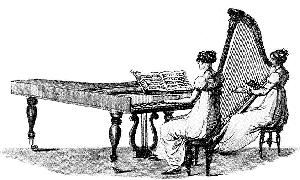 Jane Austen played for the sheer love of music and she instilled that love into her "own dear child[ren]", her heroines. She valued her time with her music, transcribing her favorite pieces into a collection of books that exist to this day. This was not, however, her chief charm. That lay in her personality, her ready wit, her "Grace and Manner". That is what she is remembered for, and why her books remain as fresh and popular today as when they were first penned, nearly 200 years ago. Her characters are not, for the most part, fabulously rich, beautiful or talented...they seem to be real people who love and are loved for who they are, not what they can do.
Jane Austen played for the sheer love of music and she instilled that love into her "own dear child[ren]", her heroines. She valued her time with her music, transcribing her favorite pieces into a collection of books that exist to this day. This was not, however, her chief charm. That lay in her personality, her ready wit, her "Grace and Manner". That is what she is remembered for, and why her books remain as fresh and popular today as when they were first penned, nearly 200 years ago. Her characters are not, for the most part, fabulously rich, beautiful or talented...they seem to be real people who love and are loved for who they are, not what they can do.
February, 2001 Sooooo...what do you think? And remember, this is for posterity, so please, be honest.... :-) Thanks! fernfir@hotmail.com | Back to Rules | Back to Sauerscrapbook |